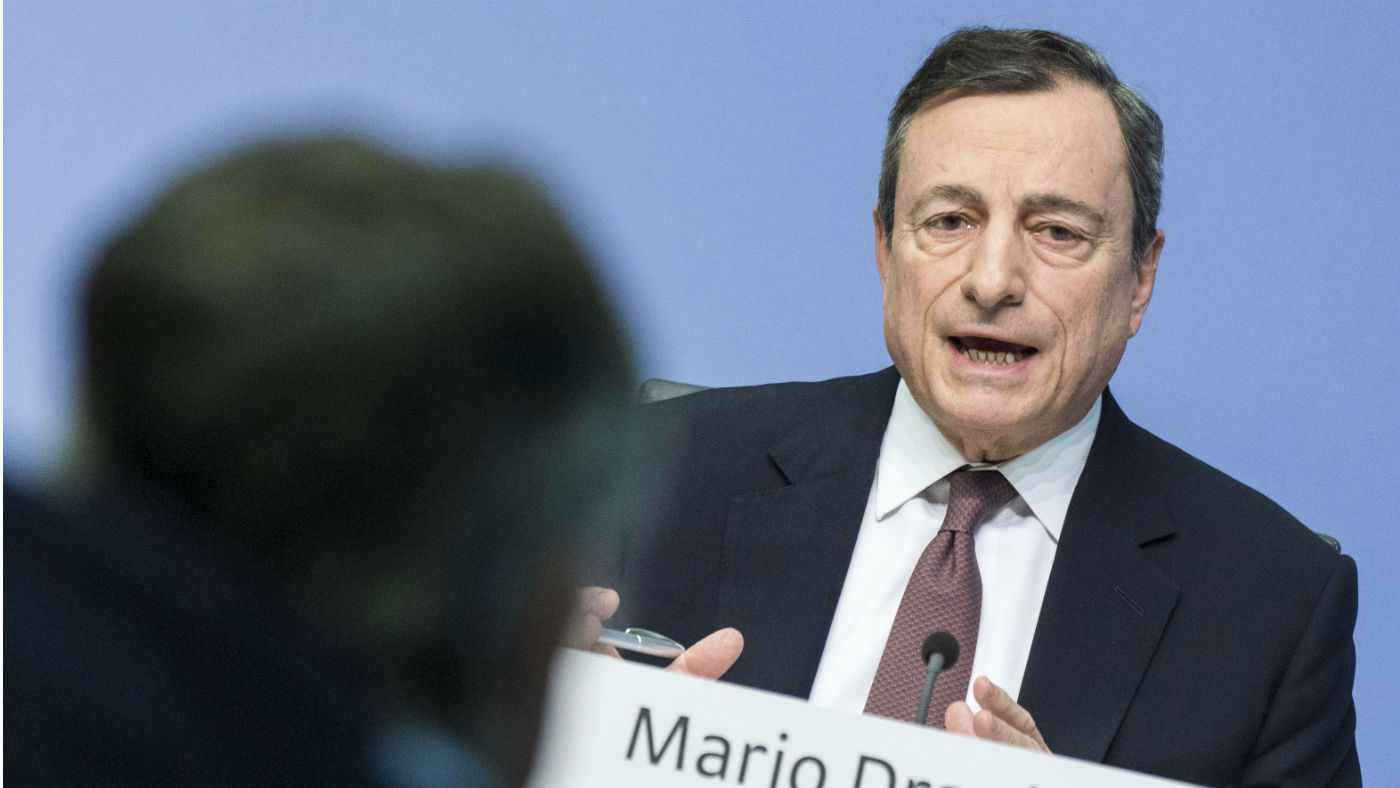ECB chief U-turns on eurozone stimulus
Mario Draghi admits ‘additional stimulus will be required’ if the economic outlook for the stuttering region does not improve

A free daily email with the biggest news stories of the day – and the best features from TheWeek.com
You are now subscribed
Your newsletter sign-up was successful
Outgoing European Central Bank President Mario Draghi has said he would be open to boosting monetary stimulus if economic conditions in Europe do not improve, drawing an immediate rebuke from Donald Trump and concerns it could provoke a currency war.
In one of his last major speeches before stepping down as Europe’s top banker, Draghi admitted that “additional stimulus will be required” if the economic outlook for the stuttering region does not improve, “signalling one of the biggest policy reversals of his eight-year tenure”, reports Reuters.
Julia Horowitz for CNN Business says this “could mean interest rate cuts or the revival of a quantitative easing program that involves creating new money to buy assets such as government bonds”.
The Week
Escape your echo chamber. Get the facts behind the news, plus analysis from multiple perspectives.

Sign up for The Week's Free Newsletters
From our morning news briefing to a weekly Good News Newsletter, get the best of The Week delivered directly to your inbox.
From our morning news briefing to a weekly Good News Newsletter, get the best of The Week delivered directly to your inbox.
Draghi’s remarks sent stocks higher and drove the euro down as much as 0.3% against the US dollar.
This provoked the ire of Donald Trump, who accused the ECB of unfairly manipulating the euro, “further raising the stakes for Washington in its trade and diplomatic disputes around the world”, says The Guardian.
Reuters reports that “with four years of unprecedented stimulus to revive the eurozone economy slowly bearing fruit, the ECB had been preparing markets for policy tightening, dubbed ‘normalisation’ — only to see a global trade war derail its plans within months”.
Growth in key member states, including Germany, Europe’s largest economy, has come close to stalling this year, while Italy slid into recession.
A free daily email with the biggest news stories of the day – and the best features from TheWeek.com
The ECB predicts that growth in the 19 countries that use the euro will slow to 1.2% this year from 1.8% in 2018. CNN says the forecast “reflects ongoing concerns about Britain's potential departure from the European Union, and the negative effect of rising global trade tensions”.
“But the ECB is not alone in having to backtrack,” says Reuters, adding that “after abandoning interest rate hikes, the US Federal Reserve may this week signal cuts in borrowing costs as global turmoil erodes confidence, hitting stocks and global trade”.
US shares surged to their highest level in six weeks yesterday after “investor hopes for an interest rate cut from the Federal Reserve in coming months were bolstered after the European Central Bank indicated that it would be willing to do the same,” reports the BBC.
However, “the slowdown in the eurozone may threaten to unpick Draghi’s legacy” says the Guardian, with the Italian “widely seen as having saved the euro after a promise in 2012 to do ‘whatever it takes’ during the sovereign debt crisis”.
-
 ‘Poor time management isn’t just an inconvenience’
‘Poor time management isn’t just an inconvenience’Instant Opinion Opinion, comment and editorials of the day
-
 Bad Bunny’s Super Bowl: A win for unity
Bad Bunny’s Super Bowl: A win for unityFeature The global superstar's halftime show was a celebration for everyone to enjoy
-
 Book reviews: ‘Bonfire of the Murdochs’ and ‘The Typewriter and the Guillotine’
Book reviews: ‘Bonfire of the Murdochs’ and ‘The Typewriter and the Guillotine’Feature New insights into the Murdoch family’s turmoil and a renowned journalist’s time in pre-World War II Paris
-
 Will increasing tensions with Iran boil over into war?
Will increasing tensions with Iran boil over into war?Today’s Big Question President Donald Trump has recently been threatening the country
-
 Corruption: The spy sheikh and the president
Corruption: The spy sheikh and the presidentFeature Trump is at the center of another scandal
-
 Rubio boosts Orbán ahead of Hungary election
Rubio boosts Orbán ahead of Hungary electionSpeed Read Far-right nationalist Prime Minister Viktor Orbán is facing a tough re-election fight after many years in power
-
 Greenland’s capital becomes ground zero for the country’s diplomatic straits
Greenland’s capital becomes ground zero for the country’s diplomatic straitsIN THE SPOTLIGHT A flurry of new consular activity in Nuuk shows how important Greenland has become to Europeans’ anxiety about American imperialism
-
 Epstein files topple law CEO, roil UK government
Epstein files topple law CEO, roil UK governmentSpeed Read Peter Mandelson, Britain’s former ambassador to the US, is caught up in the scandal
-
 Iran and US prepare to meet after skirmishes
Iran and US prepare to meet after skirmishesSpeed Read The incident comes amid heightened tensions in the Middle East
-
 Which way will Trump go on Iran?
Which way will Trump go on Iran?Today’s Big Question Diplomatic talks set to be held in Turkey on Friday, but failure to reach an agreement could have ‘terrible’ global ramifications
-
 Israel retrieves final hostage’s body from Gaza
Israel retrieves final hostage’s body from GazaSpeed Read The 24-year-old police officer was killed during the initial Hamas attack